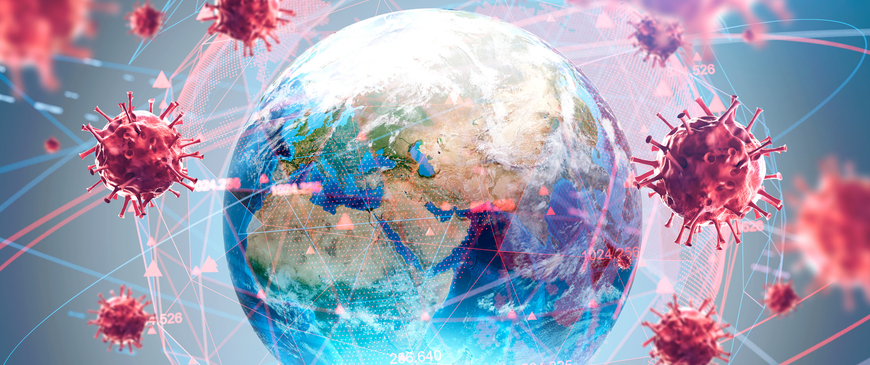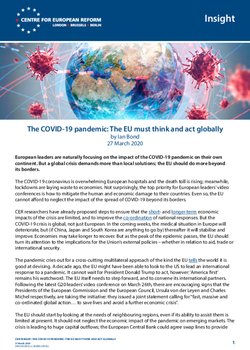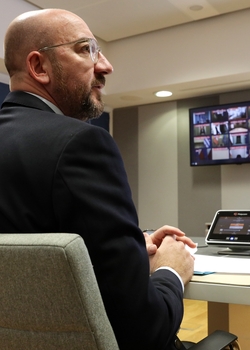
The COVID-19 pandemic: The EU must think and act globally
European leaders are naturally focusing on the impact of the COVID-19 pandemic on their own continent. But a global crisis demands more than local solutions; the EU should do more beyond its borders.
The COVID-19 coronavirus is overwhelming European hospitals and the death toll is rising; meanwhile, lockdowns are laying waste to economies. Not surprisingly, the top priority for European leaders’ video conferences is how to mitigate the human and economic damage to their countries. Even so, the EU cannot afford to neglect the impact of the spread of COVID-19 beyond its borders.
CER researchers have already proposed steps to ensure that the short- and longer-term economic impacts of the crisis are limited, and to improve the co-ordination of national responses. But the COVID-19 crisis is global, not just European. In the coming weeks, the medical situation in Europe will deteriorate, but (if China, Japan and South Korea are anything to go by) thereafter it will stabilise and improve. Economies may take longer to recover. But as the peak of the epidemic passes, the EU should turn its attention to the implications for the Union’s external policies – whether in relation to aid, trade or international security.
The COVID-19 crisis is global, not just European. As the peak of the epidemic passes, the EU should turn its attention to the implications for its external policies.
The pandemic cries out for a cross-cutting multilateral approach of the kind the EU tells the world it is good at devising. A decade ago, the EU might have been able to look to the US to lead an international response to a pandemic. It cannot wait for President Donald Trump to act, however: ‘America first’ remains his watchword. The EU itself needs to step forward, and to convene its international partners. Following the latest G20 leaders’ video conference on March 26th, there are encouraging signs that the Presidents of the European Commission and the European Council, Ursula von der Leyen and Charles Michel respectively, are taking the initiative: they issued a joint statement calling for “fast, massive and co-ordinated global action… to save lives and avoid a further economic crisis”.
The EU should start by looking at the needs of neighbouring regions, even if its ability to assist them is limited at present. It should not neglect the economic impact of the pandemic on emerging markets.
The EU should start by looking at the needs of neighbouring regions, even if its ability to assist them is limited at present. It should not neglect the economic impact of the pandemic on emerging markets. The crisis is leading to huge capital outflows; the European Central Bank could agree swap lines to provide key partners with euro liquidity. But its first priority should be helping its neighbours to stop the spread of the coronavirus. Strong external borders alone will not stop the epidemic returning. Even China, which claims to have stopped almost all ‘homegrown’ infections through extensive testing and a ruthless quarantine regime, is now seeing a small number of new cases imported from places that have been less effective in controlling the disease.
Turkey should be a particular priority for EU help: according to Johns Hopkins University Coronavirus Resource Center, as of March 25th it had almost 1900 confirmed cases, a figure that had grown tenfold in six days. Though the EU’s relationship with Ankara is certainly troubled at present, Turkey remains an important economic and security partner. If the spread of infections is not brought under control quickly, Turkey will be significantly weakened for some time to come. And while it might not be a bad thing if Turkey were less able to throw its weight around in its neighbourhood, a security vacuum in the region would not be good for the rest of Europe.
As the EU’s own medical supply situation improves, and bans on the export of essential equipment are lifted, the Union should ensure that Turkey is able to benefit from EU systems for dealing with health emergencies, such as newly established stockpile of medical equipment, ‘rescEU’, which forms part of the EU’s Civil Protection Mechanism – of which Turkey is already a member. It should also invite Turkey (and other countries negotiating to join the EU) to sign up to the Joint Procurement Agreement (JPA) for medical countermeasures, which allows the Commission to negotiate better terms with suppliers of medical equipment and vaccines than individual states can secure. EU candidate countries are already eligible to join, but none has done so.
With four million refugees and other migrants living in camps in Turkey, many of them seeking to enter the EU, there is a particularly high risk of the coronavirus spreading quickly through and then beyond this vulnerable population. The EU should discuss with Turkey what special measures might be necessary to keep COVID-19 out of the camps and to prevent it spreading among internally displaced persons in northern Syria (if it is not already too late).
EU officials are also extremely concerned about the situation in Iran, where there are a large number of cases and the healthcare system has been weakened by decades of sanctions. Medical and other humanitarian supplies are exempt from sanctions, so there is no reason why European firms should not be able to help (though some fear US retaliation).
There have so far been relatively few cases registered in Africa, though all the Maghreb countries have reported some. In Algeria, for example, the number of cases rose from 90 to 264 from March 20th to 24th. If COVID-19 spreads as fast in Africa as elsewhere, the consequences are likely to be particularly devastating: healthcare provision there is much worse than in Europe, and cramped living conditions in the cities almost guarantee that the infection will spread quickly.
Given the extent of population movements between Africa and the EU (around half a million people migrate annually from Africa – mostly the Maghreb – to Europe), it is in the EU’s own interest to help these countries in their efforts to tackle the pandemic. The statement by von der Leyen and Michel emphasises that the EU will “continue to assist vulnerable countries and communities around the world, especially in Africa”. In February, the Commission announced that it had allocated €15 million to Africa to support, among other things, rapid diagnosis and epidemiological surveillance; and EU funding helps to support a network of African centres working on clinical research and epidemic preparedness. Now would be an excellent time for the Commission and the member-states to step up both financial support to and knowledge-sharing with Africa. The EU should think about prioritising spending related to COVID-19 in its development assistance plans for the future, including in the Multi-annual Financial Framework (MFF) for 2021-2027. And it should not neglect developing countries in Latin America, particularly given the region’s ties to Spain and Portugal.
More broadly, the EU should consider how it can increase its funding for medical research, and use the money to promote co-operation with international partners in combating COVID-19. It has already allocated €47.5 million to 17 projects, some of which involve research teams from non-EU countries. There is much to be gained from the widest possible collaboration with other countries facing the same problems, provided that any intellectual property generated with EU funds is shared with all those who need it. Von der Leyen and Michel offered to organise an international online pledging event to fund the development and deployment of a COVID-19 vaccine; the sooner this can be done, the better.
Eventually, the pandemic will wane. The short-term cost of repairing the economic damage will be enormous, even if policy-makers take the right steps to ensure that the current contraction in economic activity is reversed quickly. But the EU is already concerned that border controls and disruptions to the normal flow of trade, however well-justified now, will do lasting damage to global supply chains and exacerbate tensions between major powers if they are not rolled back. Von der Leyen and Michel said unequivocally after the G20 video conference that it was “imperative that we keep trade flows and supply chains open”. Some would welcome their closure, however: White House trade adviser Peter Navarro and US Commerce Secretary Wilbur Ross have both suggested that the pandemic should result in medical and perhaps other production returning from China to the US. Prominent voices like former World Bank President Robert Zoellick and former Australian Prime Minister Kevin Rudd have warned of the strategic as well as economic dangers that such a ‘decoupling’ of the US and China might bring.
The EU (and like-minded countries such as Japan and South Korea) should start thinking now about how to prevent further global fragmentation, and avoid the development of separate Chinese and American economic and security spheres, with others left uncomfortably between them. There are certainly arguments for making supply chains more resilient, and avoiding the situation where the closure of one factory in China producing key fobs can disrupt car production in Europe. But even if it were desirable, shifting production of finished goods and components from China and other countries back to Europe would take time and divert investment from other priorities. In the wake of the contraction caused by the pandemic, inflicting further damage on economies dependent on exporting to the EU would also harm political relations between the EU and its partners. And given the fact that countries like Japan, South Korea and Singapore seem to have managed the crisis better than most countries in Europe, it is far from obvious that ‘reshoring’ would make supply chains more robust in a crisis.
With the UK in the lead, the G20 did a good job in 2008 of preventing mutually destructive national responses to the financial crisis. The current G20 chair, Saudi Arabia, is unlikely to be able or willing to play the same role. The Commission should follow up its pro-trade rhetoric, and work with other leading trading economies to ensure that the COVID-19 crisis does not become an excuse for long-term protectionist measures (even if the Trump administration takes the opposite view).
The EU should work with other leading trading economies to ensure that the COVID-19 crisis does not become an excuse for long-term protectionist measures.
Substance apart, the EU needs to think about its internal and external messages about the crisis – a point recognised in a recent blog post by Borrell, in which he referred to “a global battle of narratives”. So far, China has fought the propaganda battle more effectively than anyone else. It has managed to divert attention away from the responsibility of Communist Party officials and law enforcement in Wuhan for the initial spread of COVID-19 by suppressing bad news, and has polished its image with effective PR gestures such as supplying medical equipment and doctors to Italy and other countries, including in Africa.
Meanwhile, Trump has damaged the US’s image with his chaotic response to the spread of infections in the US, and a bizarre attack on the EU for supposedly preventing the US from selling medical equipment to Europe. An alleged attempt (denied by the US) to persuade a German vaccine firm to give the US exclusive access to a COVID-19 vaccine has made things worse. The reported refusal of the US to agree a G7 statement on COVID-19 unless it was referred to as “Wuhan virus” adds to the impression of an administration more interested in petty point-scoring than a collaborative international effort to resolve the crisis.
Disinformation and misinformation have been rife. The COVID-19 pandemic has become the latest casus belli between the US and China, with ludicrous conspiracy theories about the origin of the coronavirus batted back and forth. Chinese representatives have suggested that American soldiers brought the coronavirus with them to an international sports competition in Wuhan; an American senator has alleged that it escaped from a Chinese biosecurity laboratory in the city. Russia has been happy to add various conspiracy theories of its own, seeking to heighten US-China and US-European tensions.
Almost by chance, the EU is well placed to become a source of reliable information. Von der Leyen is a qualified doctor, who practised for some years before entering politics. She understands the science of the pandemic, as well as its economic and political implications. If the EU can get its act together and respond effectively to the pandemic, she can be a credible, non-polemical spokesperson, setting out how democracies can successfully and collaboratively tackle COVID-19 without turning their backs on their values or on the global order. Her post-G20 statement with Michel is an encouraging sign that the EU is not ready to give China a monopoly on messaging about this crisis.
Ian Bond is director of foreign policy at the Centre for European Reform.




Comments
However in recent times the right has almost gone. I think woud it better if France, Italy, Spain and Portugal start a new from scratch Southern European Union, based on comum interests, and equal troubles more or less would be more effective than the actual Union with such inequalities.
Add new comment